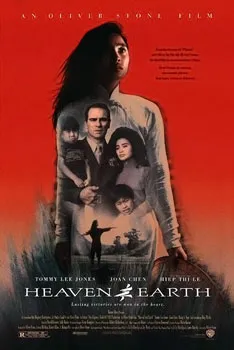Historical accuracy of Heaven & Earth

Historical accuracy of Heaven & Earth

Characters
Le Ly Hayslip
The character is based directly on the author of the memoirs the film adapts. Her experiences form the core narrative.
Steve Butler
Based on Le Ly's real husband, Ed Munro (name changed). While based on a real person, the film likely dramatizes aspects of his personality and struggles for cinematic effect.
Le Ly's Mother
Represents Le Ly's actual mother as described in her memoirs, reflecting the traditional values and suffering of Vietnamese women.
Le Ly's Father
Based on Le Ly's real father, whose experiences and traditional outlook are central to the early parts of the memoir.
Anh
Likely based on one or more of Le Ly's actual brothers mentioned in her memoirs, possibly composited or dramatized for the story.
Madame Lien
Represents the type of arrangement Le Ly entered in Saigon, though the specific character might be a composite or slightly altered.
More characters
Bernice
Likely a fictional character created to represent Steve's family and the cultural clashes Le Ly experienced in America.
Big Mike
Probably a composite or fictional character representing some of the kinder interactions Le Ly had with American soldiers.
Story
Le Ly's village life before war
Based on Hayslip's memoirs describing her childhood in the central Vietnamese village of Ky La.
Village caught between warring factions
Accurately reflects the dangerous position of many Vietnamese villages, pressured by both the Viet Cong and the South Vietnamese/American forces.
Le Ly aids Viet Cong guerrillas
Hayslip describes being forced or coerced into helping the Viet Cong as a young girl, a common experience.
Captured, tortured by South Vietnamese
This event is a key traumatic experience detailed in Hayslip's memoir "When Heaven and Earth Changed Places".
Raped by Viet Cong soldiers
Hayslip recounts being raped by Viet Cong soldiers who suspected her of being a government spy after her release, another major trauma from the book.
Fleeing to Saigon, working for rich family
Le Ly did flee her village and worked as a servant in Saigon, as described in her memoirs.
Meeting and marrying Steve Butler
Based on Le Ly meeting and marrying US civilian contractor Ed Munro (renamed Steve Butler in the film).
Moving to San Diego, USA
Le Ly emigrated to the US with her husband, settling near San Diego, California.
Culture shock and marital problems in US
Hayslip's memoirs detail her difficult adjustment to American life and the breakdown of her marriage due to cultural differences and her husband's PTSD.
Steve Butler's PTSD and violence
Based on Ed Munro's real-life struggles with trauma from his experiences in Vietnam, leading to violence and instability.
Steve Butler's suicide
The film depicts the tragic suicide of Le Ly's husband, which corresponds to the fate of Ed Munro.
Le Ly's eventual return to Vietnam
The film culminates with Le Ly returning to Vietnam years later, a journey central to her first memoir.
Depiction of civilian suffering
The film effectively portrays the immense suffering and difficult choices faced by ordinary Vietnamese civilians during the war, as told by Hayslip.
Complexity of loyalties during the war
The film shows how individuals like Le Ly were caught between sides, facing danger from all involved factions, reflecting the historical reality.
Setting
Vietnamese rural village (Ky La)
The film's portrayal of the village, rice paddies, and traditional homes appears authentic to central Vietnam during that period.
Saigon & Da Nang during wartime
Visually captures the atmosphere of South Vietnamese cities during the war, including the mix of Vietnamese life and American military presence.
American suburban setting (1970s/80s)
The depiction of Le Ly's life in the US effectively contrasts with Vietnam, showing typical American suburban environments of the era.
Costumes (Vietnamese civilians)
The clothing worn by Le Ly and other villagers (e.g., Áo bà ba, Nón lá) seems appropriate for rural Vietnamese attire of the time.
Costumes (Military uniforms)
Uniforms for the Viet Cong, South Vietnamese Army (ARVN), and US soldiers appear generally accurate for the period depicted.
Depiction of Buddhist practices
Scenes showing family altars and religious rituals reflect the importance of Buddhism in Vietnamese family life, as emphasized in the memoirs.
Marketplaces and city streets
The sets for Vietnamese markets and urban streets effectively convey the bustling and sometimes chaotic atmosphere described by Hayslip.
Lush Vietnamese landscapes
Filmed largely in Thailand, the locations effectively substitute for the Vietnamese landscapes central to Le Ly's early life and memories.
